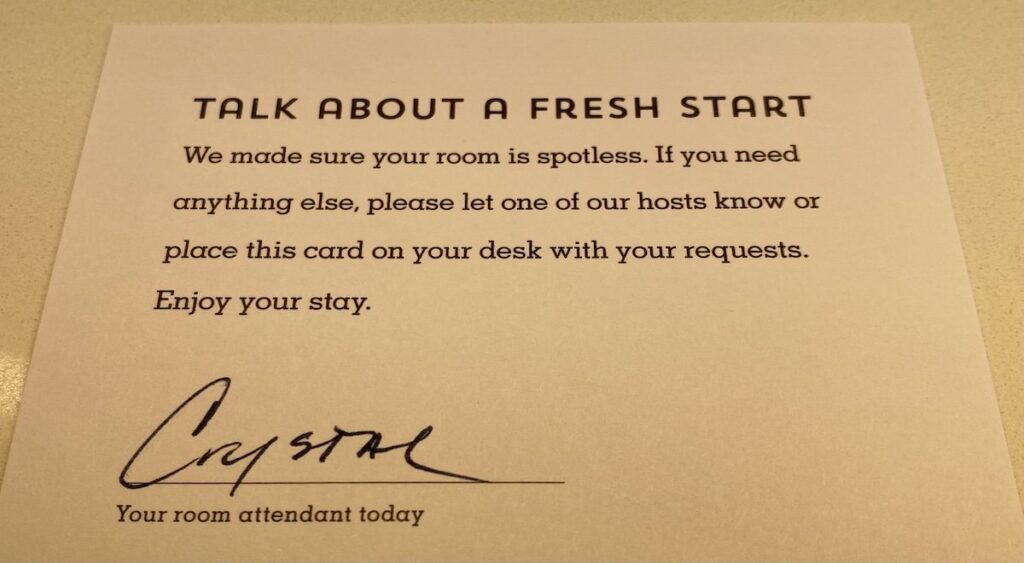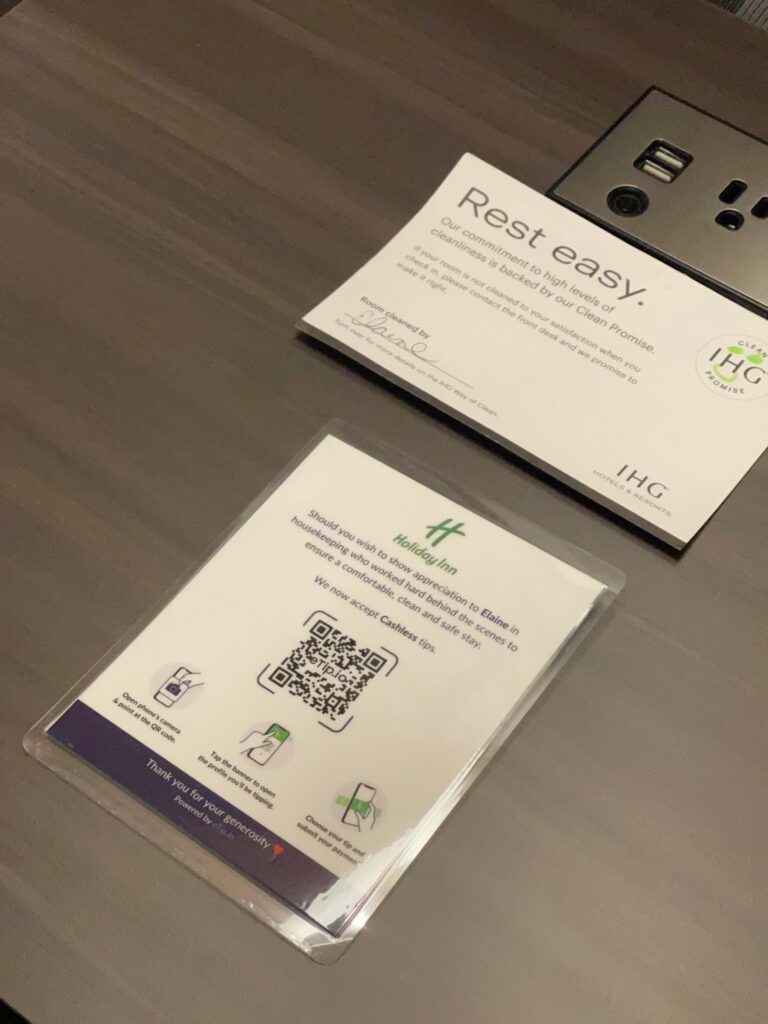Well, folks, this is a question that has boggled our minds for quite some time. I mean, aren’t housekeepers incredibly hardworking individuals who deserve a little something for making our hotel rooms sparkle? But then again, do they really expect a tip for just one night? It’s a tipping conundrum, indeed!
But fear not, dear readers, because in this article, we’re going to dive deep into this perplexing matter. We’ll explore the arguments for and against tipping housekeeping when we only stay for a measly night. We’ll discuss the potential impact on the housekeepers’ livelihoods and weigh the moral dilemma of whether leaving a tip is a gesture of appreciation or merely a social expectation. So sit tight, grab a cup of coffee, and get ready to have your tipping beliefs challenged. We’re about to uncover the secrets of the one-night stay tipping etiquette!
Importance of Housekeeping Tips
Understanding the role of housekeeping staff
Housekeeping staff play a vital role in ensuring our stays are comfortable and memorable. They are the unsung heroes who work tirelessly behind the scenes to keep our rooms clean and in top-notch condition. From making the beds to replenishing the toiletries, their efforts contribute significantly to our overall experience at a hotel.
The impact of tips on housekeeping staff
Tips have a profound impact on the lives of housekeeping staff. As they often receive low wages, tips serve as an additional source of income that helps them make ends meet. Not only do tips provide financial support, but they also act as a form of recognition for their hard work and dedication. A generous tip can brighten their day and motivate them to continue providing exceptional service.
Recognizing the efforts of housekeeping staff
It is essential to recognize and appreciate the efforts of housekeeping staff. Their job requires physical exertion, attention to detail, and the ability to work efficiently. By acknowledging their hard work, we create a positive work environment that fosters loyalty and encourages them to go above and beyond for guests.
Tipping Practices in the Hospitality Industry
Standard tipping practices
Tipping is a customary practice in the hospitality industry, and it is customary to tip housekeeping staff. The general rule of thumb is to leave a tip of $2 to $5 per night stayed. However, it is essential to check with the specific hotel’s policy, as some establishments already include a service charge in their rates, which is distributed among the staff.
Common expectations for housekeeping tips
Housekeeping staff often rely on tips as a significant portion of their income. While it is not mandatory to tip, it is considered a common courtesy to do so. Guests who appreciate the effort put into maintaining their rooms may choose to express their gratitude through a monetary tip or other gestures of appreciation.
Factors that influence tipping in short stays
Tipping practices may vary depending on the length of the stay. In the case of a one-night stay, some guests may question the necessity of tipping, as the housekeeping staff only have a limited amount of work to do. However, it is important to consider the value of their contribution, regardless of the duration of the stay.

This image is property of cdn.onemileatatime.com.
Considerations for Tipping on a One-Night Stay
The value of a one-night stay to housekeeping staff
While a one-night stay may seem brief, it still requires the same level of attention and effort from the housekeeping staff. The staff must still clean the room, change the sheets, and ensure that all amenities are fully stocked. Their efforts remain the same, regardless of whether the guest stays for one night or an extended period.
Alternative ways to show appreciation
If you feel uncomfortable tipping for a one-night stay, there are alternative ways to show your appreciation. Leaving a note expressing your gratitude, writing a positive review, or personally thanking the housekeeping staff can go a long way in making them feel valued.
Personal considerations when deciding whether to tip
When deciding whether to tip, personal circumstances should be taken into account. If a guest is on a tight budget or has limited funds, it is understandable that tipping may not be feasible. However, guests who have the means to do so should consider the impact their tip can have on the lives of the housekeeping staff.
Benefits of Tipping Housekeeping on a One-Night Stay
Motivating and encouraging housekeeping staff
Tipping housekeepers on a one-night stay can significantly motivate and encourage them. It shows that their efforts are recognized and valued, encouraging them to continue providing excellent service. This motivation can create a positive work environment, leading to increased job satisfaction and ultimately benefitting the guests.
Promoting a positive work environment
A generous tip not only benefits the individual housekeeping staff member but also fosters a positive work environment overall. When employees feel appreciated and acknowledged, it creates a ripple effect, leading to improved interactions and service for all hotel guests. The positive atmosphere contributes to a more enjoyable and memorable stay for everyone.
Building a good reputation for future visits
By tipping housekeeping staff on a one-night stay, guests can help build a good reputation for themselves and future visitors. Word-of-mouth recommendations play a significant role in the hospitality industry, and happy staff are more likely to speak highly of considerate guests. This positive feedback can lead to better service and upgrades during future visits.

This image is property of etip.io.
Arguments Against Tipping on a One-Night Stay
Challenging the expectation of tips
Some argue that tipping should not be expected, especially for minimal service on a one-night stay. The housekeeping staff’s job remains largely the same, regardless of the duration of the stay, and therefore may not warrant an additional tip. They believe that the hotel’s responsibility includes adequately compensating their employees for their work.
Questioning the fairness of tipping for minimal service
Critics of tipping on a one-night stay question whether it is fair to receive a tip for what they consider minimal service. They argue that housekeeping staff should already be compensated for their duties and that tipping should be reserved for exceptional service or extended stays.
Exploring alternatives to tipping in short stays
For those who choose not to tip on a one-night stay, there are other ways to show appreciation without tipping. As mentioned earlier, leaving a positive review, thanking the staff personally, or even recommending the hotel to friends and family can be effective ways of expressing gratitude.
Etiquette and Practices for Housekeeping Tips
Guidelines for appropriate tip amounts
While tipping is a personal decision, there are some general guidelines for determining an appropriate tip amount. As mentioned previously, a range of $2 to $5 per night stayed is considered customary. However, guests who have had an exceptional experience or wish to show their appreciation can choose to tip more generously.
Ensuring tips reach the intended recipients
It is essential to ensure that tips reach the intended recipients. Leaving a tip on the nightstand or in a clearly marked envelope with a note of thanks is a common practice. This ensures that the tip does not get mistaken for trash or left behind during the housekeeping staff’s rounds.
Expressing gratitude in addition to monetary tips
While monetary tips are appreciated, expressing gratitude in addition can make a lasting impact. Leaving a handwritten note expressing your appreciation or personally thanking the housekeeping staff during your stay can go a long way in making them feel valued and appreciated.

This image is property of www.southernliving.com.
Personal Experiences and Stories
Anecdotes of tipping practices on one-night stays
Many guests have shared personal anecdotes of their experiences with tipping on one-night stays. Some have found that even a small tip can make a significant difference in the housekeeping staff’s morale and the overall quality of service received. Others have described heartwarming interactions when they personally thanked the staff for their hard work.
Perspectives from both guests and housekeeping staff
Obtaining perspectives from both guests and housekeeping staff provides valuable insights into the tipping dynamic. While some guests may struggle with the decision to tip on a one-night stay, many housekeeping staff emphasize the impact even a small tip can have on their lives. They express gratitude for every tip and value the recognition of their efforts.
Lessons learned from real-life scenarios
Real-life scenarios often teach us valuable lessons about tipping practices. Whether it is an unexpected upgrade or personalized gestures of appreciation from the housekeeping staff, these experiences shape our understanding of the importance of tipping and its effects on both guests and staff.
The Role of Hotels in Ensuring Fair Compensation
Implementing fair wages and benefits for housekeeping staff
Hotels have a responsibility to ensure fair compensation for their housekeeping staff. Implementing fair wages and benefits can alleviate the financial burden on employees, reducing their reliance on tips as their primary source of income. By valuing their work and providing adequate compensation, hotels can create a more equitable environment for their staff.
Encouraging guests to tip and appreciate housekeeping
Hotels can play a significant role in encouraging guests to tip and appreciate the housekeeping staff. By educating guests about the importance of tipping and recognizing their efforts, hotels can foster a culture of gratitude and appreciation. This can be done through signage or in-room information that highlights the significance of housekeeping staff and the impact of tipping on their livelihoods.
Corporate responsibility in recognizing housekeeping’s importance
Hotel chains and corporations have the power to recognize the importance of housekeeping staff on a larger scale. By implementing policies that ensure fair compensation, benefits, and recognition, they can demonstrate their commitment to employee welfare. This recognition can go beyond monetary compensation and include programs that promote career development and advancement opportunities.

This image is property of viewfromthewing.com.
Conclusion
Balancing personal preferences and etiquette
When it comes to tipping housekeeping staff on a one-night stay, it is important to balance personal preferences with etiquette. While tipping is not mandatory, it is considered a common courtesy to show appreciation for their hard work. Understanding the value of their contributions and considering personal circumstances can help make an informed decision.
Considering the impact of tipping on housekeeping staff
Tipping housekeeping staff on a one-night stay can have a significant impact on their lives. It serves as a form of recognition and additional income that can motivate and encourage them to continue providing exceptional service. By tipping, guests contribute to a positive work environment that ultimately benefits everyone.
Making an informed decision based on individual circumstances
Ultimately, the decision to tip on a one-night stay should be based on individual circumstances. While hospitality industry standards suggest tipping, it is important to consider personal budget limitations or other factors that may influence one’s decision. Regardless of the choice made, it is crucial to express gratitude and acknowledge the efforts of the housekeeping staff in other ways.

